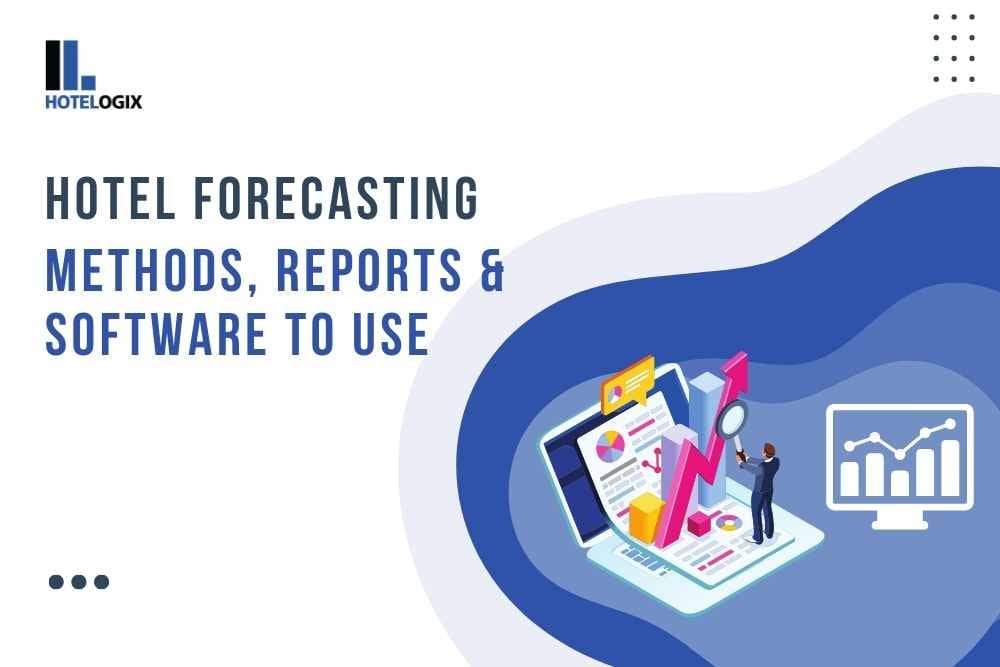Hotel forecasting, also known as hotel demand forecasting, is a strategic process that predicts future demand for hotel rooms and services based on historical data, market trends, and various influencing factors. It is an essential practice for hoteliers and revenue managers to optimize pricing, maximize occupancy, and enhance overall profitability.
What is Hotel Forecasting?
Revenue managers utilize historical hotel performance data, current industry trends, and future demand to make informed projections to maximize revenue. It involves forecasting key metrics such as demand, occupancy, average daily rate, and RevPAR (revenue per available room).
Importance of Hotel Forecasting
Hoteliers use forecasting to anticipate and plan their operational needs, financial goals, and revenue management strategies. By forecasting operations, they can predict their staffing requirements for upcoming holiday or demand seasons.
Hotel financial forecasting helps hoteliers set targets by predicting fiscal outcomes. Revenue management forecasting enables hoteliers to maximize their potential by predicting future demand, projecting room sales, estimating average daily rates, and determining total revenue.
Hotel Forecasting Methods- Best Practices
- Collect accurate data: Gather accurate historical data on occupancy rates, average daily rates (ADR), revenue per available room (RevPAR), and other relevant metrics.
- Use advanced analytics tools: Employ sophisticated forecasting tools and software to analyze large datasets and provide actionable insights.
- Update forecasts regularly: This will help you understand the latest market trends, booking patterns, and external factors such as economic changes or seasonal events.
- Segment your market: To create more precise forecasts, segment your market into different categories, such as business travelers, leisure travelers, group bookings, etc.
- Monitor competitors: Keep an eye on competitor activities and market position to adjust your strategies accordingly.
- Involve multiple departments: To ensure a comprehensive approach involving various departments, including sales, marketing, and finance, in the forecasting process.
Benefits of Hotel Forecasting
- Optimized pricing: Accurate hotel demand forecasting enables dynamic pricing strategies that maximize revenue and occupancy.
- Improved hotel budgeting: Forecasting helps create more accurate budgets by predicting revenue and expenses more precisely.
- Enhanced decision-making: This allows you to make informed decisions on marketing campaigns, staffing, and inventory management based on reliable forecasts.
- Increased guest satisfaction: Anticipating demand allows for better resource allocation, ensuring that guests receive timely and quality services.
Factors that Affect Hotel Demand Forecasting
- Historical data: Past occupancy rates, booking data, cancellation data, ADR, and RevPAR provide a baseline for future predictions.
- Market trends: Changes in travel behavior, economic conditions, and competitor actions impact demand.
- Seasonal variations: Seasonal trends such as holidays, festivals, and peak travel periods affect hotel demand.
- External events: Conferences, sporting events, and other local events can significantly influence demand.
- Economic indicators: Economic health, including GDP growth, employment rates, and consumer confidence, affects travel demand.
How do we Forecast Demand?
- Analyze historical data: Examine past booking patterns, occupancy rates, and revenue metrics.
- Monitor market trends: Stay updated with industry reports, competitor activities, and economic forecasts.
- Use predictive analytics: Leverage forecasting software that uses machine learning and predictive analytics to anticipate demand.
- Consider external factors: Incorporate adjustments for known future events, economic conditions, and market shifts.
How do we Forecast Hotel Occupancy?
- Track booking pace: Monitor the pace at which bookings are being made for future dates.
- Analyze lead times: Understand the average lead time for bookings to predict occupancy levels.
- Analyze segments: Forecast occupancy for different market segments to gain detailed insights.
- Use regression models: Employ statistical models to predict occupancy based on historical data and influencing factors.
How do we Forecast Hotel Revenue?
- Historical revenue analysis: Examine past revenue performance to identify trends.
- Market and economic analysis: Incorporate market conditions and economic indicators into your forecast.
- Predictive modeling: Use revenue management software to create predictive models based on various scenarios.
- Regular monitoring and adjustment: Continuously monitor actual performance against forecasts and adjust strategies as needed.
Leveraging a Hotel Forecasting Software
Hotel forecasting tools boast high accuracy thanks to advanced algorithms and machine learning, while automated processes save time and minimize errors. Real-time data integration keeps your forecasts current, and advanced analytics provide deep insights into market trends and demand patterns.
What is a Hotel Forecast Report?
A hotel forecast report is a detailed document that provides predictions on future occupancy rates, revenue, ADR, and other key performance indicators. It serves as a guide for strategic planning and decision-making.
How to Generate Hotel Forecast Reports
- Gather data: Collect historical data on occupancy, ADR, RevPAR, and other metrics.
- Input data into the hotel forecasting software: Use advanced forecasting software to analyze the data and generate predictions.
- Review and adjust: Review the initial forecast, make necessary adjustments for known variables, and validate the results.
- Present the report: Create a clear and comprehensive report that includes charts, graphs, and actionable insights.
Read Also: Key Hotel Management System Reports
Hotel forecasting is a critical practice for you and your revenue manager. You can optimize your operations, enhance guest satisfaction, and achieve financial goals by leveraging accurate data, advanced tools, and best practices. The benefits of hotel forecasting are manifold, from improved budgeting and resource allocation to strategic decision-making and increased profitability.
This report includes daily, weekly, monthly, quarterly, and yearly reports, offering a detailed overview of your property's past performance.
You can accurately forecast market demand, occupancy rates, seasonal trends, and more by analyzing these reports. This insight enables you to set prices strategically, ensuring that you maximize revenue by offering the right room to the right guests at the right time.

